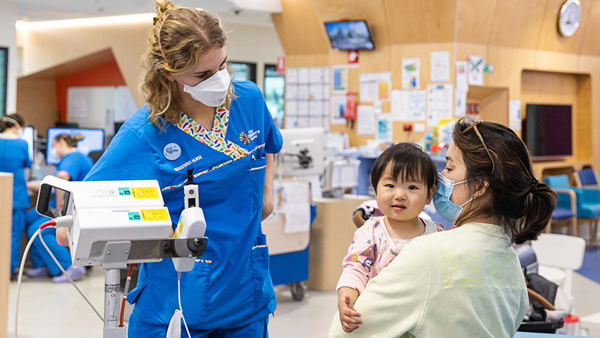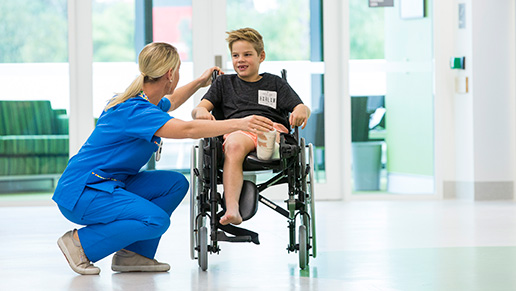Going home

At PCH we provide care and treatment for children and young people until they are ready to go home or able to continue care at home, in our Hospital in the Home program or be transferred to a hospital closer to home.
You may hear the term EDD. This is your ‘Expected date of discharge’.
Soon after you arrive in hospital you will be given an ‘expected date of discharge’ (expected date you will leave hospital) which will be reviewed regularly during your stay.
If you live in the country, the medical team may discuss with you the need to remain in the metro area for a few days after discharge. Please arrange your own accommodation either with family, Ronald McDonald House or hotels prior to discharge. The PATS (Patient Assisted Travel Scheme) team based at your local hospital can provide financial assistance towards accommodation and return travel.
Your child’s doctor or nurse will let you know when your child is well enough to go home or be transferred.
Things you need to know
Discharge planning starts as soon as your child is admitted to hospital. This ensures that every child can go home as soon as they are well enough. We will work with you to answer any questions or concerns you may have.
Discharge from the hospital usually happens by 10am, however this can occur whenever your doctor determines your child is well enough to go home.
Once your child starts to improve, they may begin a Criteria-Led Discharge Pathway. This pathway allows any member of the medical or senior nursing team to safely discharge your child home when they meet their health goals.
You will need to organise someone to pick you up.
Ensure you understand the instructions for your child’s care at home, including a phone number to call should you have any concerns.
What you need to take with you
Please ensure you take home:
- any personal belongings such as clothes and toys belonging to your or your child
- any medications you brought in from home
- Any private x-rays or scans
What we will give you

Discharge Summary
We will give you a letter which provides a summary of your child’s recent admission, treatment, and medications while in hospital.
A copy of this letter will also be sent to your general practitioner.

Medications
The ward Pharmacist will arrange the medications you will need and give you instruction on how to give these before you go home.

Equipment
Your child will be assessed by one of our allied health team for any special equipment, such as crutches, to go home.
They will arrange this and make sure you and your child know how to use the equipment before you go home.

Medical Certificate
You can request a medical certificate for your child, for school or for yourself to cover work.
Please ask your nurse or doctor for this on the day of discharge.

Instructions for when you get home
You will be given information and instructions on your child’s care needs at home.
Please ask questions if there is anything you don’t understand.
Please contact the ward or treating team via the PCH switchboard on 6456 2222 if you are concerned about your child’s condition.
If your child’s condition deteriorates or you have urgent concerns for your child’s health or wellbeing, please go to the Emergency Department at PCH or a hospital closer to home.
Transfer to Care Closer to Home
Local hospital transfer
Transferring patients to continue care at a local hospital helps ensure that all patients can receive the right care, in the right place. From those who are very unwell and need specialist care, to those who are still recovering.
If your child is transferred to your local hospital they will be admitted directly to the ward. Your child’s treating team will work directly with the local paediatric team at the hospital to ensure your transfer goes smoothly.
The decision to transfer or discharge your child is always made by the treating team, with consideration to your child’s condition, ongoing care requirements and following a discussion with the family.
Hospital in The Home (HiTH)
Hospital in The Home is another option for care closer to home if you live in the metro area.
HiTH allows for children and young people who are in a stable condition to receive care and treatment by nurses at home as an alternative to hospital care.
Nurses will visit your home and offer nursing care, assessment, advise and support.
Criteria Led Discharge
Criteria Led Discharge involves a discussion between you, your child’s doctor and nurse, to decide what health goals and medical criteria must be met before a patient can be discharged from hospital.
This discussion will take place soon after admission to the ward, with agreed upon conditions or criteria documented in the medical notes.
This process ensures your child can return home from hospital as safely and quickly as possible.
Once your child meets their goals and criteria, any member of the medical or senior nursing team can safely discharge them home.
After Your Child has been Discharged
A visit to hospital is a big event in a child’s life, even if it is only for a day procedure.
Often after a stay in hospital, children will go through a period of readjustment to home. You may notice your child is more demanding, emotional or anxious. You may also notice change in your other children’s emotions and behaviour.
If you feel their reaction is excessive or prolonged, please see your GP or contact Keeping Kids in No Distress (KKIND) via the PCH hospital switchboard on 6456 2222.

